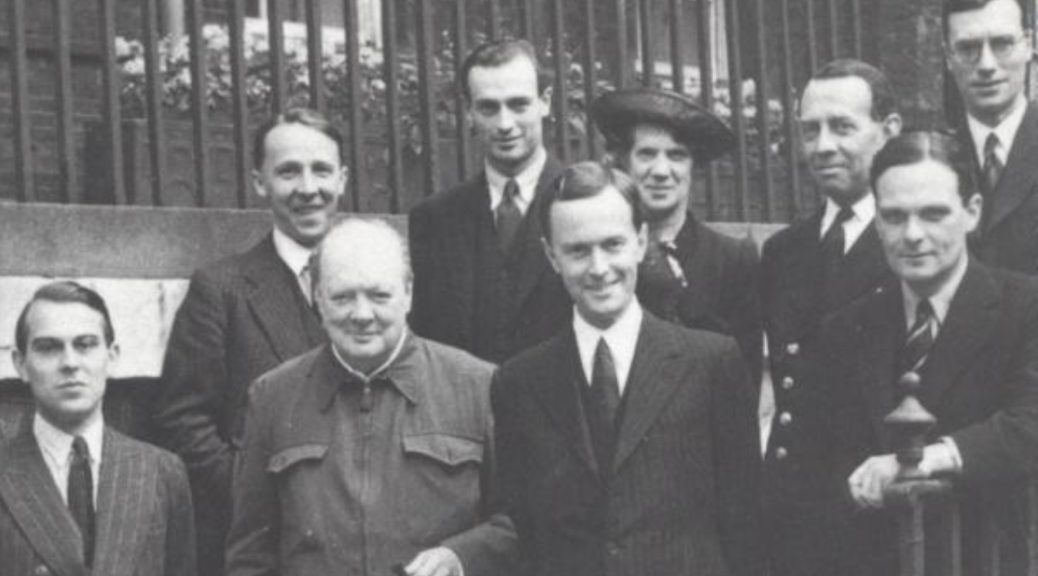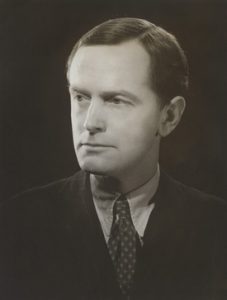
Martin on Churchill: No One Left Without Feeling a Braver Man
Q: On William Pitt and Winston Churchill
I’m searching for a quote about William Pitt the Elder, used also about Churchill in 1940. It goes something like, “No one left his presence who did not feel braver.” But it’s more eloquent. —M.M., Indiana
A: Bruce: “Continuance is unnecessary.” Churchill: “Rot.”
Indeed so. The quote is from the 30 May 1940 diary of John Martin, one of Churchill’s private secretaries, first published in Martin Gilbert’s Official Biography, Winston S. Churchill, vol. VI, Finest Hour 1939-1941 (Hillsdale, Mich.: Hillsdale College Press, 2013), 435-36:
During May 30 [1940] Desmond Morton sent Churchill a seven page note by the Australian High Commissioner in London, Stanley Bruce, arguing, in one of its paragraphs, in favour of an international conference “to formulate a peace settlement.” Churchill struck out this paragraph, and wrote in the margin: “No.” Crossing out Bruce’s final point, that “the further shedding of blood and the continuance of hideous suffering is unnecessary” and that the belligerents should “cease the struggle,” Churchill wrote: “Rot,” and went on to note, for Morton: “The end is rotten.” That night one of Churchill’s private secretaries, John Martin, wrote home: “The PM’s confidence and energy are amazing. ‘Nobody left his presence without feeling a braver man’ was said of Pitt; but it is no less true of him.”
Sir John Martin KCMG CB CVO

Born in Edinburgh, John Martin entered the Civil Service in 1927, joining the Colonial and Dominion Offices. His final posting was British High Commissioner for Malta in 1965 before retirement in 1967. Along with Sir John Colville, he was an observant recorder of life with Churchill as a Principal Private Secretary during the Second World War. His diaries are published in Michael Jackson, A Scottish Life: Sir John Martin, Churchill and Empire (1999).
Martin correctly identified the original quote, said of William Pitt the Elder, by Colonel Isaac Barré, Treasurer of the Royal Navy. He did not quote it exactly, however. According to Macaulay’s Essays on William Pitt, Earl of Chatham (1898) Barré said: “No one ever entered his closet who did not come out of it a braver man.“
“If this long island story of ours is to end…”
The date of John Martin’s comment is significant. Two days earlier, on May 28th, Churchill had prevailed in the debate over whether to seek an armistice with Hitler. This was proposed by Lord Halifax, with Mussolini as the intermediary. After a long harangue with Halifax, Churchill addressed his non-Cabinet ministers (Gilbert, 420):
I have thought carefully in these last days whether it was part of my duty to consider entering into negotiations with That Man [Hitler]…. The Germans would demand our fleet—that would be called “disarmament”—our naval bases, and much else. We should become a slave state…. And I am convinced that every man of you would rise up and tear me down from my place if I were for one moment to contemplate parley or surrender. If this long island story of ours is to end at last, let it end only when each one of us lies choking in his own blood upon the ground.
“A white glow, overpowering, sublime…”
In his war memoirs, Churchill recalled the reaction:
There occurred a demonstration which considering the character of the gathering—25 experienced politicians and Parliament men, who represented all the different points of view, whether right or wrong, before the war—surprised me. Quite a number seemed to jump up from the table and come running to my chair, shouting and patting me on the back. There is no doubt that had I at this juncture faltered at all in the leading of the nation I should have been hurled out of office. I was sure that every Minister was ready to be killed quite soon, and have all his family and possessions destroyed rather than give in. In this they represented the House of Commons and almost all the people.
It fell to me in these coming days and months to express their sentiments on suitable occasions. This I was able to do because they were mine also. There was a white glow over-powering, sublime, which ran through our Island from end to end. (Their Finest Hour, 1949, 48.)
Churchill’s reply to the critics
Before and since we’ve heard the refrain. Churchill destroyed the British Empire and laid the way for Russo-American hegemony. He rejected Realpolitik and refused to deal with “That Man.” It is not widely known that Churchill himself had an answer to this. It came shortly after his retirement in 1955. His private secretary. Sir Anthony Montague Browne, decided to play devil’s advocate. Why not seek an armistice? He records Churchill’s answer in Long Sunset (1995), 200:
You’re only saying that to be provocative. You know very well we couldn’t have made peace on the heels of a terrible defeat. The country wouldn’t have stood for it. And what makes you think that we could have trusted Hitler’s word—particularly as he could soon have had Russian resources behind him? At best we would have been a German client state, and there’s not much in that.






